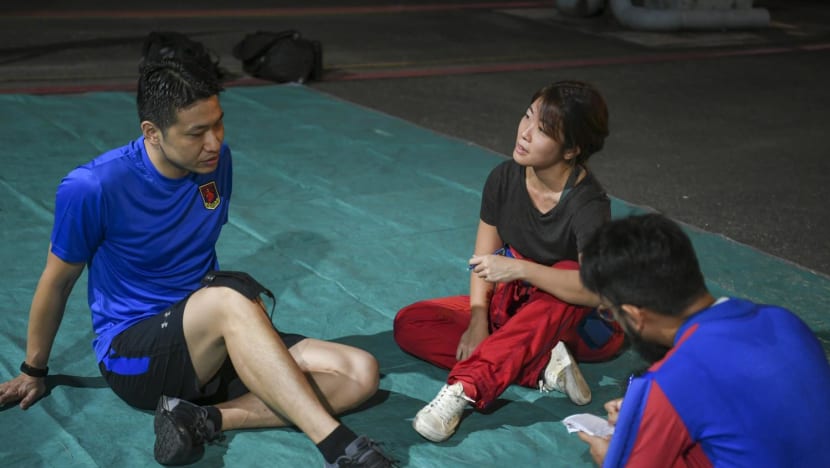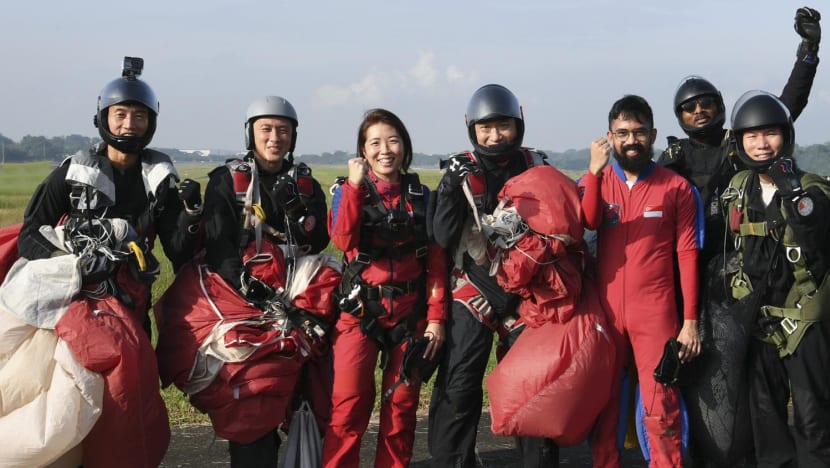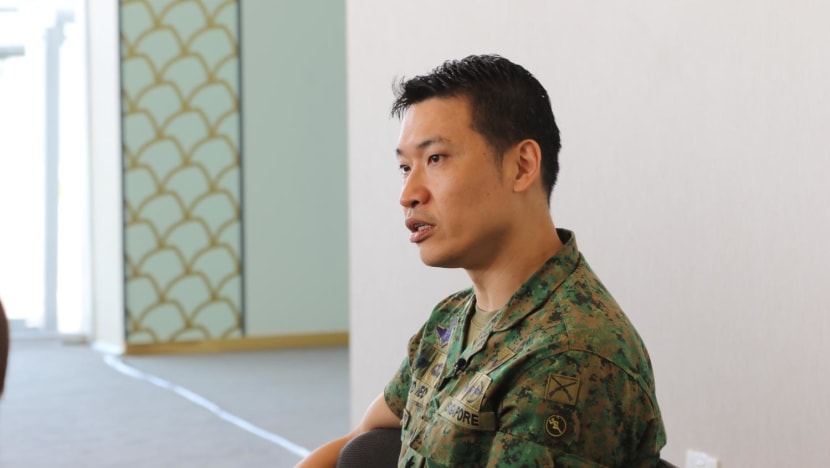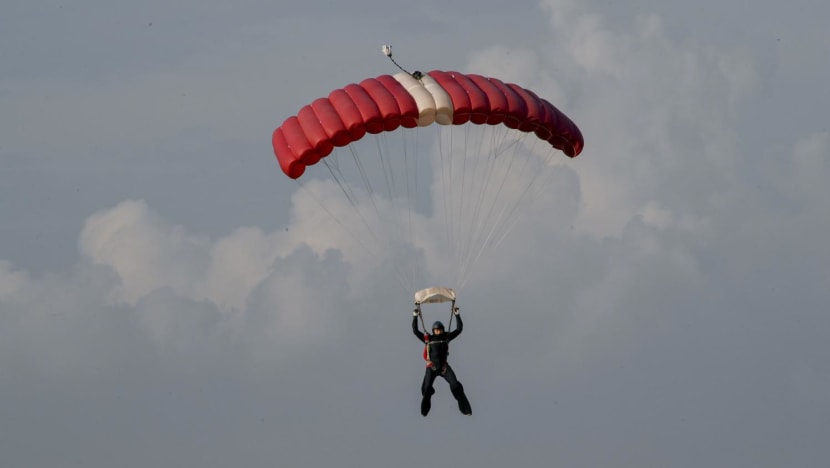Getting to know Singapore's Chief of Army by jumping out of a plane with him

Chief of Army Brigadier-General (BG) David Neo dishes out advice for first-time skydivers before our jump. (Photo: MINDEF/SAF)
SINGAPORE: As the Chief of Army for the Singapore Armed Forces (SAF), Brigadier-General (BG) David Neo is familiar with tough standards, applying a similar exacting philosophy to his life.
The 44-year-old firmly believes in living life to its fullest – and part of this includes seizing the chance to do a freefall jump from 10,000 feet on Wednesday (May 25) from the C-130 aircraft.
Having clocked around 200 jumps since he was 18 years old, he appeared to be an expert at staying calm amid chaos.
He rattled off tips for first-time skydivers like myself and another reporter, who were given the opportunity to do a tandem jump at the same time.
“Don’t take yourself too seriously. Take the time to smell the roses, and enjoy the experience,” he said before we boarded the plane. “Don’t get caught up in the technicalities.”
Throwing in an analogy, he likened jumping out of a plane to having a big fan blow beneath you, allowing the wind to carry you. It’s unlike, say, leaping off a cliff such as in bungee jumping, where the drop could feel more severe.
“It’s about an orientation of the mind and how you frame things,” he said.
Almost anyone else saying the same might be treated with scepticism. After all, it’s easy to dish out such advice when jumping out of a plane has become second nature.
But listening to BG Neo – or David, as he told me to call him – relay his hard-won life lessons from 26 years of skydiving felt reassuring.
A LOVE FOR SKYDIVING
Admitting to being an adrenaline junkie, BG Neo considers skydiving and skiing among the more “heartbeat-racing events” that he partakes in. Crossfit, on the other hand, which he also does, is comparatively “mundane”.
But he “never had the opportunity” to take his love for skydiving further, such as by becoming part of the Singapore Armed Forces (SAF) parachute team, Red Lions. There were “other things” that SAF wanted him to do, he said.
Before he became the Chief of Army on Mar 10, BG Neo was the deputy secretary (technology) at the Ministry of Defence.
As the first commando officer to become the Chief of Army, he served in various command appointments in the SAF, including as Commanding Officer First Battalion Singapore Guards, Commander 2nd Singapore Infantry Brigade and Commander 3rd Singapore Division.
He has also held key staff appointments, including Head of Joint Plans and Transformation Department and Director of Joint Operations, where he oversaw the SAF’s contributions to the national fight against COVID-19.
But when he is free, he pursues his passion for skydiving because of a “morbid thought” that involves imagining himself at 65 or 70 years old without having lived the life he wants to live.
“I’ve got 20 years left”, he said. “In life, be the best we can be.”
“It’s a high-risk activity, but if it’s something our own soldiers can do, it’s something I should be able to do,” he added.
BEING THROWN AN UNEXPECTED SCENARIO
Mastering challenging situations, like a freefall jump or being integral in Singapore’s fight against COVID-19, is “not about an absence of fear”, BG Neo said.
It is, instead, about having “the ability to understand the situation”.
Take Apr 6, 2020 – a date that he will likely remember forever.
That day, his phone rang at 5am with a call from his boss, the Chief of Defence Force, to tell him about the situation in the migrant worker dormitories, BG Neo shared during a media session with more reporters after his jump.
“Much as we prepared for 200 over scenarios, these were all scenarios where we thought SAF could make a difference. Under no imagination did we think SAF would be asked to go into dorms and help manage (them). That was not quite in our conceptualisation,” he said.
BG Neo said that they could only afford to send about six to nine people into each dormitory to look after thousands of migrant workers.
“In most of the situations when you're called to step forward, I think it was a scenario we had thought about. … But in the case of COVID, we’re facing an enemy virus that is still pretty much unknown. We didn't know how it moved, how it operated, how we need to deal with it,” he said.
“It was one of those situations where, indeed, I was quite clear in my mind that this is something we have never done before. We are not prepared for this. And we could fail.”
But the SAF officers went in, “mission-focused” and with “gumption”.
“More than that, I actually had large numbers of officers raising their hands to step forward to volunteer to contribute, despite the fact that it is a very daunting mission,” he added.
“The good thing is that sometimes the mind is a little bit like that. Once you expand it, you can never quite shrink it back again. … Now that we’ve done something that we have never quite prepared for, then next time something like that comes along, we’ll just be, ‘Okay, that’s just like the last time we went into the migrant worker dormitories. It’s not a problem.’”

BEING READY, THE “POWER” OF NATIONAL SERVICE
As such, one of the personal reflections BG Neo had from the last two years of COVID-19 was the need to be ready.
“I will tell you that actually when you're the (Director of Joint Operations) of the SAF, you make it your obsession to make sure that the SAF is ready every second,” he said.
In one instance, SAF was tasked to pack masks for every Singaporean household within 48 hours and met with a hurdle: A lack of plastic bags.
“No organisation in Singapore had 1.3 million Ziploc bags to put the four surgical masks into and seal it up. There was only one organisation that had 1.3 million Ziploc bags. It was in the army logistics base. And those were things that were put in place to be prepared for emergencies,” he said.
“It was a reminder to us about being prepared, being ready, and to take this seriously. Because you never know when you will be asked to (step up).”
Another lesson BG Neo took from the pandemic was “the power of the little green man”. He was referring to the little green man that flashed on TV in the past, together with a code name, to alert those who needed to report for duty.
“It is this idea that because we have national service, we all speak a certain common language. We have a certain common mindset. So for example, when you're asked to go into the dorms to help, it was actually a fairly good surprise,” he said.
BG Neo elaborated that when they roped in representatives from three different hospitals to help SAF manage the migrant worker dormitories, he thought about how SAF needed to “think about how to communicate” with these medical professionals “in a nice way”.
“Very quickly one of them just said, ‘Sir, sir, no need, no need, stop, stop. We are NS men. We know what to do. We are medical officers. You don’t need to explain too many things to us. You just tell us what's the ops plan, and we will get it done,’” he recalled.
“So that’s sort of the power of national service in a moment of crisis. And I think you'll see that not just in the operations we did together with the medical officers; there are also other areas like with MOM (Ministry of Manpower).
“You just see our NSmen everywhere. There's this common language, common lingo, common ethos, and the common idea of being mission-focused to just get our nation out of the crisis.”
ATHLETES AND NATIONAL SERVICE
With the lessons of COVID-19 under BG Neo’s belt, NS is therefore necessary. But he also understands the pain points, such as those recently raised by national swimmer Joseph Schooling involving managing the public’s expectations of athletes who are serving NS.
On May 18, Schooling had said in Hanoi during the 31st SEA Games that it was crucial to have a dialogue to discuss what these expectations are and be realistic about them.
"It's all about how we can both grow together, and how NS and sporting achievements can coincide,” Schooling said then.
Having been a former sportsman during his junior college days, the issue is “near and dear to (BG Neo’s) heart”.
“Obviously, the army is supportive of all national sportsmen. Within guidelines, we will be able to do as much as possible to employ some level of flexibility to support our sportsmen and allow them to train where it's feasible,” he said.
“I just want to caveat that fundamentally national service is still for the critical need of defence. When it comes to critical training, such as Basic Military Training and vocational training, that training has to come first.
“But … where there’s room to be flexible, I think we are more than prepared to do that.”
BG Neo cited Defence Minister Ng Eng Hen’s speech in Parliament in 2018 when the Ministry of Defence rejected footballer Ben Davis’ deferment request.
In particular, the point about personal sacrifice resonated with him. He was the “worst kind of sportsman” as a hurdler, he admitted.
“Unlike team sports, where you work for the good of the team, as a hurdler, you're trained to be focused on yourself. … Which is why the idea of sacrifice resonates very strongly with me. It’s about the few coming together to put aside what's important to us to work for the needs of the larger group, the defence of the nation,” he said.
“Whenever we are called upon to do that, to the 18-year-old (and) my 18-year-old self as well, it's always a big sacrifice. But we willingly do that, because we understand this is required to maintain our way of life, to defend the nation, to make sure that Singapore continues to exist as an entity.”

SAFETY AS A CORE VALUE
To strengthen the army under his leadership, BG Neo plans to “enshrine safety as a core value”.
“We are systematising safety learning from past incidents and near misses, so that safety lessons can transcend generations,” he said.
“SAFTI (SAF Training Institute) will also help our commanders take safety from just logical understanding to emotional internalisation. So that our commanders, young officers, especially cadets, will be very serious about safety, so that we do not become complacent.”
Over the last few years, BG Neo said, the “culture of safety” has been “taking root” in SAF’s units.
For instance, their surveys showed that more than nine in 10 soldiers reported being confident in their safety systems, as well as confident to speak up should they see anything not right in everyday training.
“Safety is an area where we cannot afford to be complacent and is an area where we must continue to be exceptional because it's … the duty of every army commander to make sure that every single soldier that comes through our gates goes home a better soldier,” he added.
But safety, at least the way I see it, is also a feeling that you get in someone’s presence.
In a separate conversation with BG Neo after he wrapped up the media interview, I asked him whether he sees a common psychological trait among the Red Lions.
It is the ability to maintain your sense of humour, he replied, giving me an answer I did not expect.
“It gives your men hope and optimism.”
Before our jump, he had said the “nerves go away once you’re comfortable”, and I found myself believing him despite the vagueness of his statement.
In the plane, before moving to the edge of the door where my tandem instructor and myself will take our leap, BG Neo gave me the handshake that his men do before every jump to wish each other a safe jump. He had taught me on the ground, joking that I could forget everything else I learnt today except that.
We slapped each other’s palms, knocked our knuckles together, and ended off with a finger point at the other party.
I waited for the nerves to come, but they never did.















